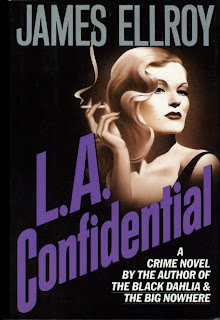Allow me to explain: This small novella affected me almost more than anything else I've read. It was disturbing, incredibly disturbing. There are few books that can actually shake and unsettle me as much as this has, and at the same time, in its own way, it's bittersweet. It wormed its way into my brain and tugged at some very deep feelings, the feelings that I don't usually allow to come to the surface or even let out at all. And, considering I'd read this right after "Twittering from the Circus of the Dead", it's no wonder that I stayed up until almost six in the morning and didn't fall asleep until almost seven with all these thoughts whirling around in my brain.
I'm drifting again. Allow me to get to the point.
"Clockwork Girl" is a novella by Athena Villaverde. Villaverde is a fairly recent addition to the Bizarro literary scene. Her work appears in The Bizarro Starter Kit: Purple, she's written one novel titled Starfish Girl (canny readers may notice a naming trend), and wrote a collection with "Clockwork Girl" as the titular story. The novella follows a sentient clockwork girl named Pichi from her first memories on Christmas Day all the way through her life. Pichi is given as a present to Marisol, the young girl of a rich family. At first, Marisol is reluctant to receive such a gift, as Pichi was formerly a poor child whose body was replaced with clockwork and turned into a sentient toy, but eventually she comes around and introduces Pichi to her toyroom. The early parts of the story detail Marisol and Pichi as they play hide-and-seek, paint the walls of the playroom, play with Marisol's clockwork dog named Maki, and do other wonderful childhood activities. As the story goes on, Pichi develops a deep and abiding love for Marisol.
But here's the thing. Children grow up. Toys do not. And when children grow up, some of them outgrow their toys.
So from Pichi's point of view, we see Marisol grow more distant, and drift away from her and away from the playroom. And if the story ended there, it would be absolutely heartbreaking. But it gets worse. All from Pichi's point of view. As she tries to desperately hold on until Marisol comes home from college. As she has to find someone to wind her so she won't die. As she endures the family, who all treat her not as a little girl, not as a playmate, but as a toy to be played with and thrown away. It's the emotional equivalent of torture porn.
What makes it wrenching is that it's easy to understand, but hard to fight. Everyone grows out of their childhood affectations at some point or another, and it's something we accept. It's a part of life. But from this point of view, it's horrifying to think of such a thing. And Villaverde makes it very vivid and packs every parargaph full of enough detail to have made me feel like I've been punched. What makes this book good, what makes it dangerous, is the way it plays with your empathy. The opening passages are lyrical and sweet, sort of like a twisted version of Winnie-the-Pooh. The dark hints creep in slowly, and before you know it, the rug's been pulled out from under you, and all that's left until the last two or three chapters is a long tunnel of despair with only the briefest light. I am incapable of tears*, but trying to empathize with Pichi made me hurt. I wanted to rescue her, but I realized everyone does the same thing,
We all grow up. We get older. Some of us manage to hold on to the accouterments of childhood, and others of us shed them without a second thought. The toys we discard we give no second thought to, importance of them notwithstanding. Athena Villaverde has basically taken this and weaponized it. With her vivid descriptions and brutally optimistic internal monologue, she made me feel sad for growing up.
I suppose I should tell you at the end of this all that there's a happy ending. By that point, you've been so violated in your sense of empathy it's like watching a train wreck and then finding a buck on the sidewalk-- it's nice, but it doesn't erase the horror that came before it.
So in the end, I can't recommend this. It's like "The Little Match Girl" on steroids. This is the most remarkable and amazing thing I've read this year, but it left me disturbed and upset and practically hollowed out. So I can't recommend it. But if you find it, if you read it, I will tell you this: It's very, very good. I just don't want to ever read it again.
TOMORROW:
The Geek Rage/Strange Library Book of the Year is revealed
AND THIS WEEKEND:
Winter's Tale by Mark Helprin



.jpg)






.jpg)
.jpg)




.jpg)





















